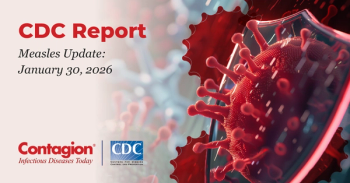
- February 2017
- Volume 2
- Issue 1
The Reasons Individuals Refuse Vaccines May Surprise You
More education on the illnesses individuals are risking by refusing vaccines may help to address the issue.
United States residents declined vaccines for preventable diseases at varying rates during their visits to health care providers before em­barking on trips abroad, a new study reports, while also sounding the call for more effective education about disease risk.
“In addition to posing a risk to the individual traveler, vaccine-preventable diseases acquired during interna­tional travel can also spread among susceptible popula­tions in the United States,” the researchers cautioned in The Journal of Travel Medicine.
1
The most frequent reason given for nonacceptance of one or more recommended vaccines was a lack of con­cern about the associated illness. In compiling the data, surveyors were tasked with recording one of three rea­sons for a traveler’s vaccine refusal: cost concerns, safety concerns, or not concerned with the illness.
“Going into the analysis, we had some preconceived notions that cost would be an important barrier, but, in fact, that did not play out,” Regina LaRocque, MD, MPH, the report’s senior author and an infectious disease spe­cialist at Massachusetts General Hospital, told Conta­gion™ in a phone interview. “Similarly, safety was not the most commonly cited reason for refusing vaccines.”
With the paucity of concern about illness emerging as the main explanation for vaccine refusal, “that seems like something we can actually remediate by providing travelers more important information, more education, about the illnesses that these vaccines are designed to prevent,” said Dr. LaRocque, also an assistant professor of medicine at Harvard Medical School.
Researchers examined the findings on travelers seen for pre-travel health advice from July 1, 2012, through June 30, 2014, in the Global TravEpiNet (GTEN) consortium. Sup­ported by the Centers for Disease Control and Prevention (CDC), GTEN consists of US clinical practices that provide pretravel health care to international travelers.
The 23 GTEN sites that contributed data to this anal­ysis are spread across the United States and include ac­ademic practices, health care consortia, health mainte­nance organizations, pharmacy-based clinics, private practices, and public health clinics. At each location, an institutional review board either approved or exempted the study.
Of the 24,478 participants, 23,768 (97%) were eligible for at least 1 vaccine, but 6,573 (25%) refused one or more recommended vaccines. Travelers were most frequently eligible for typhoid, hepatitis A, and influenza vaccines. Eligible travelers overall declined the following vaccines: meningococcal disease; rabies; Japanese encephalitis; and influenza.
For nine vaccines (see Table2), researchers calculated refusal rates among eligible travelers in accordance with CDC recommendations in effect at the time of travel. Vaccine advisories were updated continuously based on guidance issued by the CDC Travelers’ Health Branch (www.cdc.gov/travel).
“We always recommend that people discuss this with their provider and that they see their provider four to six weeks before they travel,” said Mark Sotir, PhD, MPH, epidemiology and surveillance team lead in the CDC Travelers’ Health Branch, in a phone interview. “Some­times it takes time to do a clear evaluation for different illnesses and there are some vaccines where you need multiple doses.”
The study reviewed refusals for the following vaccines: hepatitis A, influenza, meningococcal disease, teta­nus-diphtheria/ tetanus-diphtheria-acellular pertussis, and typhoid fever for all travelers; rabies for individuals staying longer than 28 days in a high-risk country; po­lio for visitors to countries where it was indicated, as defined by CDC recommendations in place at the time of travel; Japanese encephalitis for individuals heading to countries endemic for the illness; or yellow fever for travelers to entirely or partially endemic nations, based on CDC guidance for those travel dates. Researchers ex­cluded travelers from their analysis of refusal if they had pre-existing immunity or a medical contraindication to the vaccine or if the clinician determined that the vac­cine would not be relevant to the traveler’s itinerary.
In the multivariable analysis, travelers planning to visit friends and relatives in developing countries were less likely to consent to all recommended vaccines than those not visiting friends or relatives. Countries were classified per the 2011 United Nations Human Develop­ment Index (very high human development, high human development, medium human development, and low hu­man development), as well as 2009 World Health Organi­zation geographical regions.
Using a secure internet tool, travelers entered specifics about their medical history, destination countries, pur­pose(s) of travel, geographic scope of travel (urban, rural, or both), anticipated activities and accommodations, and trip’s length and dates. Travelers could select multiple re­sponses for purpose of travel and destination. After con­firming this information, clinicians recorded additional data about the traveler’s immunization history, health ad­vice provided, vaccines accepted or declined, and medi­cations prescribed during the pretravel consultation.
“These are motivated travelers—people who have tak­en the time to seek a pretravel health encounter,” LaRo­cque said. “Obviously, many travelers don’t bother to do that, so you could suppose that in the whole spectrum of people who are traveling internationally that many peo­ple are not getting vaccinated as you would wish.”
In the future, the GTEN consortium of research sites plans to delve into “deeper reasons of why people don’t have the fear of these diseases,” said Dr. Sotir. Obtaining more data on different individuals “increases the gener­alizability of your results.”
Table. Travel-Related Diseases2
Disease
Mode of Transmission
Symptoms (can include)
Hepatitis A
Contaminated food or water
Sudden onset of fever, tiredness, loss of appetite, nausea, vomiting, stomach pain, and jaundice.
Influenza
Coughing, sneezing, contaminated surfaces
Fever, chills, cough, sore throat, runny or stuffy nose, muscle or body aches, headache, and tiredness. Nausea, vomiting, and diarrhea occur more in children.
Meningococcal Disease
Close contact with an infected person
Sudden fever, headache, stiff neck, nausea, vomiting, increased sensitivity to light, and confusion. Children and infants may show different signs, such as inactivity, irritability, vomiting, or poor reflexes. Infection of the blood can cause tiredness, vomiting, cold hands and feet, chills, severe aches and pain, fast breathing, diarrhea, and a dark purple rash.
Tetanus
Injury with a contaminated object through any type of break in the skin, such as wounds, burns, or animal bites.
Lock-jaw, headache, painful muscle stiffness, trouble swallowing, seizures, fever, high blood pressure, difficulty breathing, and paralysis.
Diptheria
Coughing, sneezing, skin sores
Fever, sore throat, thick coat in the throat and nose, neck swelling, and skin sores. In severe disease, swelling of the heart and nerves and trouble breathing can occur.
Pertussis (Whooping Cough)
Coughing, sneezing
Runny nose, low fever, mild cough, and a pause in breathing for babies. Later symptoms of the disease include fits of many rapid coughs followed by a high-pitched “whoop,” vomiting, and exhaustion.
Typhoid Fever
Contaminated food and water
Lasting high fevers, weakness, stomach pains, headache, loss of appetite, constipation, and rash.
Rabies
Saliva of infected animals
Fever, headache, and general weakness or discomfort. As the disease progresses: insomnia, anxiety, confusion, slight or partial paralysis, excitation, hallucinations, agitation, hypersalivation, difficulty swallowing, and hydrophobia. Death usually occurs within days of the onset of these symptoms.
Polio
Person-to-person contact and
contaminated food or water
Fever, tiredness, nausea, headache, nasal congestion, sore throat, cough, stiffness in the neck and back, and pain in the arms and legs. Rare cases: permanent loss of muscle function in the arms or legs (usually the legs). If there is loss of function of the muscles used for breathing or infection of the brain, death can occur.
Japanese encephalitis
Mosquito bite
Five to 15 days to develop fever, headache, vomiting, confusion, and difficulty moving. Symptoms that develop later include swelling around the brain and coma.
Yellow Fever
Mosquito bite
Three to 6 days to develop fever, chills, headache, backache, and muscle aches. About 15% of people who get yellow fever develop serious illness that can lead to bleeding, shock, organ failure, and sometimes death.
Please note that this list is not comprehensive and for more information, go to wwwnc.cdc.gov/travel/destinations/list. Travelers with questions concerning vaccinations should consult their healthcare practitioner. SOURCE: CDC.gov
Susan Kreimer, MS, is a medical journalist with more than 2 decades of experience. Her coverage has informed consumers, physicians, nurses, and health system executives. Ms. Kreimer holds a master’s degree in journalism from Columbia University and lives in New York City.
References:
- Lammert SM, Roa SR, Jentes ES. Refusal of recommended travel-related vaccines among US international travellers in Global TravEpiNet. J Travel Med. 2016;24(1). pii. Taw075. Print 2016 Jul. doi: 10.1093/jtm/taw075
- Centers for Disease Control and Prevention. Disease directory. CDC website. https://wwwnc.cdc.gov/travel/diseases. Accessed January 9, 2017.
Articles in this issue
almost 9 years ago
A Pharmacist's Role in HIV Antiretroviral Stewardship in the Hospitalalmost 9 years ago
Staying Ahead of the Changing Healthcare Landscapealmost 9 years ago
West Nile Virus Infections May Prove Deadlier Than Previously Thoughtalmost 9 years ago
Up-and-Coming Prevention Methods for Clostridium difficilealmost 9 years ago
Another Tick-Borne Disease Growing in the United States: Powassan Virusalmost 9 years ago
Decongestants and Hypertension: Dangerous Togetheralmost 9 years ago
The Great Debate: Polymyxin B Versus Polymyxin ENewsletter
Stay ahead of emerging infectious disease threats with expert insights and breaking research. Subscribe now to get updates delivered straight to your inbox.

































































































































